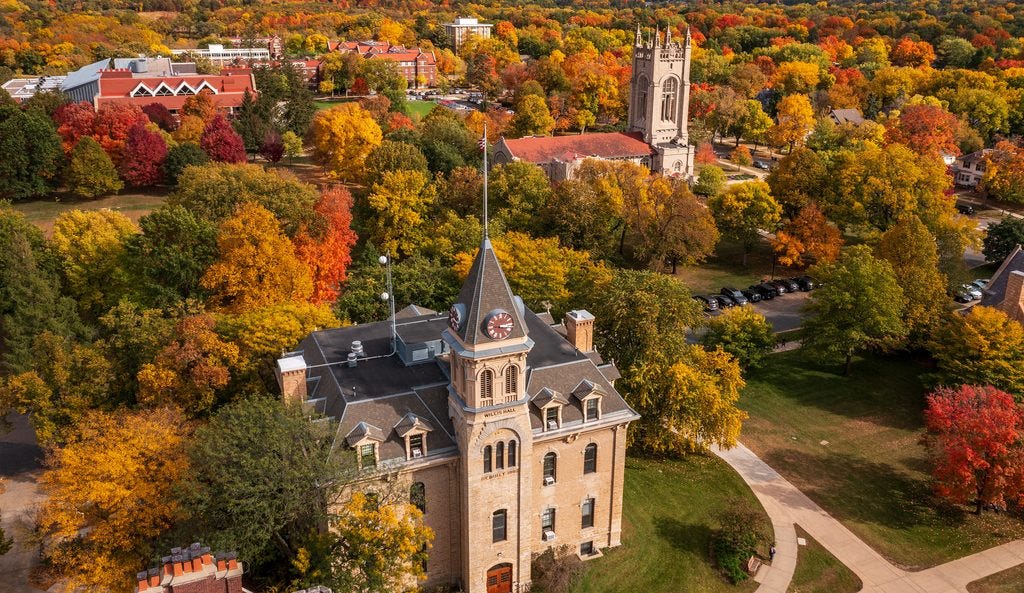Carleton College's New Statement on Academic Freedom
As colleges and universities revise their academic freedom policies, here is what we like about ours
Colleges and universities across the country are busy revisiting and revising their free speech and academic freedom policies. Here at Carleton College in Northfield, Minnesota, we were part of a special committee charged with drafting a new academic freedom statement. The statement was approved by the faculty and the Board of Trustees last academic year and has now been incorporated into Carleton’s faculty handbook. The full text of the statement appears below—followed by some bullet points that spell out what we see as the statement’s key features.
Carleton Statement on Academic Freedom
Carleton College upholds academic freedom as essential to the College’s mission to provide an exceptional undergraduate liberal arts education. It is crucial to developing the curiosity, creativity, and critical thinking that Carleton seeks to cultivate. As an institution of higher education, Carleton is dedicated to the common good. The common good relies on the unfettered pursuit of knowledge in an environment that is welcoming, respectful, and free. Academic freedom protects faculty, students, and the College as a whole from undue influences and constraints, external or internal, and preserves the free conduct of teaching, scholarship, and learning at the center of the College’s mission.
Carleton endorses the principles and guidelines regarding academic freedom that have been developed by the American Association of University Professors (AAUP) over more than a century. The AAUP, in its 1940 Statement of Principles on Academic Freedom, grounds academic freedom in credentialed expertise, asserting that professors should be free to carry out their research and teaching without fear or favor because they are experts whose professional work advances human knowledge and contributes to the common good. The educational process will sometimes be uncomfortable or unsettling, especially when pre-existing ideas and beliefs are challenged. Academic freedom includes the right to entertain and express diverse ideas and viewpoints, including those that may be surprising, controversial, or offensive. Academic freedom protects the rights of all faculty.
The four pillars of academic freedom are as follows:
Freedom of inquiry and research: faculty are entitled to full freedom in research and in the publication of results. Research for pecuniary return should be based on an understanding with the College.
Freedom of teaching: faculty are entitled to freedom in the classroom in teaching their subject and in developing their pedagogy. Inside the classroom, professors have the authority to decide what to teach based on their academic expertise and the parameters of a particular discipline or field. They also have the prerogative to decide how to teach based on their pedagogical goals and the broader objective of helping students develop critical thinking skills.
Freedom of intramural speech: faculty governance depends on academic freedom, with professors holding the primary responsibility for educational matters ranging from design and content of the curriculum to recommendations for faculty hiring and promotion. Academic freedom protects speech in the context of faculty governance.
Freedom of extramural speech: faculty are private individuals and community members. As such, they should be free from institutional censorship or discipline when speaking on matters of public concern. However, as associates of learned professions and employees of the College, they should remember that the public may judge their institution by their utterances. Hence, they should make an effort to indicate that they are not speaking for Carleton when engaging in extramural speech.
As leaders of the institution, the President and Provost have a responsibility to protect academic freedom with support from the FPC, ECC, and FAC.
Relevant AAUP documents: the 1915 Declaration of Principles on Academic Freedom and Academic Tenure; the 1940 Statement of Principles on Academic Freedom and Tenure; and the 2007 Freedom in the Classroom Report.
Here are some of the strengths of this statement, as we see things. It:
starts with the assertion that academic freedom is essential to the mission of a liberal arts education
proponents of academic freedom, it seems to us, would do well to consistently highlight WHY it matters for learning, teaching & research
grounds academic freedom in AAUP principles
the core academic freedom principles advanced by the AAUP have been around for more than a century
the AAUP academic freedom framework is intelligible and applicable across different kinds of higher ed institutions
emphasizes that the educational process sometimes requires students to move out of their comfort zones—and that academic freedom protects the right to learn about and discuss material that may be *surprising,* *controversial* or *offensive*
language like this is important when the left and right alike are wielding the discourse of harm/safety to intervene in what’s taught in college classrooms
connects academic freedom to faculty governance
faculty should be in the driver’s seat when it comes to making decisions about the curriculum as well as faculty hiring & promotion
academic freedom, including the freedom to challenge administrative initiatives and priorities, is a necessary pre-condition for genuine faculty governance
integrates pedagogy into freedom of teaching
HOW to teach should be equally protected along with WHAT to teach
includes strong extramural speech protections
public statements by professors generate many of today’s academic freedom controversies but extramural speech is absent from many official policies





Did I miss it? The statement of the academic freedoms of non-professors (TA's, assistant professors et al) and students?
Glaringly absent are the rights and expectation of students, mission of the institution, and accreditation. “Faculty” have too grand idea of themselves.